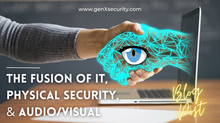How Cloud-Based Security-As-A-Service Connects You To Your Property 24/7/365

Security-as-a-service is a cloud-based security system that can be accessed anywhere, anytime. As the cloud landscape changes and more people turn to cloud based systems for their security needs, it's important to know what this shift means for your business.
The following blog post will explore how security as a service is changing the way we think about information technology in general and specifically where it relates to enterprise security.
The cloud has been around for several decades, but it wasn’t until the COVID-19 pandemic that cloud computing became a critical component of protecting our business data. During this time, cloud-based security systems became a critical component of addressing the health-safety needs that emerged due to COVID. Now, when it comes to protecting your business and data, cloud computing is an essential part of the strategy.
Security-as-a-service, or cloud security, means that everything in the system is on cloud and you don't need to worry about any servers or hard drives storing your data at all. The cloud is a cloud of servers, which are connected to each other and managed by a cloud provider. In the case of security-as-a-service, this cloud contains all your data and all access control information--creating an interconnected system that's accessible anywhere, anytime. Security-as-a-service also includes ongoing monitoring for intrusion attempts or suspicious activity on the network; 24/365 customer support from experts in cybersecurity; guaranteed 99% uptime with backup power supplies; encryption for data at rest (i.e., when it’s stored) and in transit (i.e., while being transmitted); full compliance with industry standards such as SOC II Type I & SOC III; and HIPAA compliancy.
The days of going into an office building are changing due to a "new normal" created by the pandemic and in the future more people will be able to work remotely on their own terms. But, this also means new challenges arise with respect to IT administration, including ensuring compliance with HIPAA regulations related to patient privacy rights when it comes time for telemedicine appointments.
Access Control As A Service (ACaaS)
In the past, a company needed to own and install its access control devices in order to protect their assets. This meant purchasing expensive on-premise hardware that is difficult to manage over time. Plus, installing these systems requires specialized technicians with specific installation knowledge while ensuring compliance standards are met for regulatory requirements like fire codes and ADA accessibility guidelines; all of which cost money.
Nowadays, not only can building managers buy SaaS services without worrying about device management headaches or upfront costs (or ongoing maintenance) but they also get added benefits such as remote site surveillance via video feeds or real-time data analytics that show when unauthorized entry has been attempted.

In the post-pandemic era, security is of utmost importance to any building. Controlling who enters which room can be difficult without a scheduling system and an access control system hooked up together. This way, permanent records are created for every person that entered each part of the facility at what time — making it easier to pinpoint potential threats or suspicious activities in real-time; improving your chances of preventing crime before it happens as well reducing labor hours wasted on manual data entry.
The pandemic has moved this kind of Cloud computing from an added benefit to a must-have, and organizations are spending on it. In fact, recent Gartner survey data indicates that almost 70% of the companies using them plan to increase their use after COVID-19 disrupted things.
The traditional access control business is a fast-growing and competitive market, with approximately $5 billion in North America. The addressable U.S. market is already projected to be over four times as large at about $28 billion - this expansion has been driven by cloud-based systems and services that are on the rise in popularity for both companies who want an edge when it comes to security data management or those looking for more simplified system setup options. The traditional integration businesses will expand by 4x; or new competitive integrations companies are likely to be born as the demand continues outpacing supply.
Every Industry Wants Remote Access
In the real estate industry, it’s common to have to manage hundreds if not thousands of tenants across multiple multifamily units. But before pandemic, manually provisioning and deprovisioning renters as they moved in or out of individual apartments was burdensome task that could take days.
Remote access control can help to make sure that all facilities are in compliance and up-to-date with safety protocols. With the use of a mobile device, it's easier than ever for management to update directories remotely so they're more accurate and updated on any changes made at anytime around their facility or when traveling out of state.
Provisional access presents a different challenge in the corporate world. Building and database maintenance have become increasingly difficult due to software applications needed for employees' day-to-day jobs.
Using AI To Detect Events Before They Happen
Artificial intelligence is changing the way we think about life and security. As technology advances, so does society as a whole - including cybercrime prevention methods. Machine learning algorithms are now being applied to security data streams in order to better predict future events before they happen; helping companies stay safe from attacks or malware intrusions by recognizing patterns that may seem harmless at first but can lead into larger threats down the line (see anomaly detection). The possibilities of artificial intelligence have yet been discovered fully, but for us it means having more peace-of-mind when using our devices because machine recognition will be able to detect bad things long beforehand than any human could ever hope for themselves without help!

By linking the access control events with on-premises security cameras, you can now monitor and detect abnormal behavior that may warrant a deeper investigation. Anomaly detection records individual movement in and out of a building by using both access data from your system along with video surveillance to proactively identify when there is an irregular or unusual request for entry outside of normal activity patterns associated with that person's account.
With the help of access control as a service, you can protect your building and its inhabitants by pairing an on-premises biometric camera with power cloud-based remote monitoring. This new level of detailed monitoring provides increased security against threats that would otherwise go undetected without this added protection.
Don't Let Your Location Security Fall Behind
The property industry is changing and the time has come for real estate professionals to get on board with these new technologies. It took just a few years before we all became addicted to our smartphones, now imagine how quickly you will feel that it’s necessary when your office becomes inaccessible due an internet outage or some other technological disaster!
GenX Security has a range of security and access control systems and technologies for any property, any industry, and any size. Let's connect to have one of our security integration experts visit your location, give you a solid assessment, and a fast, fair, and free quote!
Experience the next generation of interactive security services and solutions with GenX Security.

With custom security integration solutions come custom quotes designed for your needs. Please contact us by clicking here or calling 866-598-4369.






























Comments